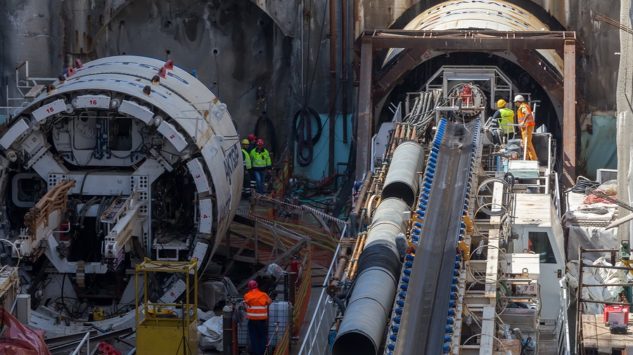Issue Briefs

The delusions of infrastructure spending
Martin Hutchinson
September 7, 2018
President Trump is wise in many things, but he has two economic beliefs that are irredeemably foolish: low interest rates and infrastructure. To the joy of die-hard Hillary-lovers, I now propose to criticize one of those two beliefs: that in infrastructure. By and large, it is thoroughly overpriced currently, and very often it yields far more costs than benefits, as examples around the world can show.
Overselling Belt and Road
The infrastructure question has come up most recently in relation to China’s “Belt and Road” initiative, whose principal purpose appears to be to tie Third World countries to China through massive debt obligations.
China’s upgrade of Kenya’s Nairobi/Mombasa railway, for example, is said to have cost twice what it should have, burdening the Kenyan economy and not yielding any significant return in Kenyan economic development.
This is not simply a matter of Chinese foreign policy. From all accounts the country’s domestic infrastructure is equally ill-chosen, and in many cases superfluous. Among the many weaknesses in the Chinese economy an excess of pointless infrastructure and the debt associated thereto is among the most glaring.
Channel Tunnel did not work as intended
There are many examples outside China of money being wasted on infrastructure, however. One study a few years ago calculated that the entire Channel Tunnel project across the English Channel had merely been a subsidy from infrastructure providers to consumers, and that its net effect on the economies of the countries concerned had been negative.
Likewise, much of the Japanese infrastructure spending on rural roads has been wasted also, providing beautiful new highways for areas of the country where the population is declining.
Getting population projections wrong
Getting the population projections wrong in either direction is another way to mess up infrastructure investment. Underestimate and you must replace the facility long before its useful life is ended. Overestimate and you may end up like Cleveland; beautifully free from traffic jams because of its 1960s freeway system designed for three times today’s population but having to watch carefully for potholes because today’s shrunken population can’t afford proper maintenance.
Is new infrastructure really essential?
Proponents regard infrastructure as essential, the industrial equivalent of brushing your teeth. Without it, we are supposed to believe that economic development would never happen, and countries would remain mired in poverty.
To suggest this is nonsense, I propose a thought experiment: what would the British 19th and 20th Centuries have looked like if there had been no railways in Britain? The Industrial Revolution can be supposed to have started as scheduled, with steam engines to power the factories (these after all appeared nearly half a century before the railways) but, for whatever reason, it never occurred to anyone to lay tracks across the countryside and run trains on them.
Technologically, this would have slowed development in the medium term. Turnpike roads would have been developed further, and coach services, which had already grown greatly in the century to 1830, would have expanded further. Thus, capital in those services would not have been lost, as it was in our timeline, while the capital needed to build a network of railways would have been available for other purposes. We can suppose a certain amount of technological substitution, as fast steamships ran services up the major rivers and along the already developed canal network. If other countries such as the United States had used railways, Britain would have been at a modest technological and cost disadvantage, but not an insurmountable one, given the river, road and canal network that already existed.
Britain would have looked very different
Nevertheless, the Britain of 1890 would have looked very different. The working classes would not have acquired greater mobility. Goods would have remained more expensive in cities that were not close to major rivers or coasts, and the pattern of factory development would have been quite different, with heavy industry entirely concentrated along the coasts, where ocean transport was available.
Around 1890, the internal combustion engine would have appeared, as it did in our timeline. But its development would have been much faster, since the economic value added of automobiles –and especially trucks and buses– would have been much greater if there were no trains.
A network of fast motorways would have appeared around 1910, and development would then have converged towards the world we now live in, with a denser road network and probably fewer private automobiles and far more use of buses, some of them perhaps articulated for long distance travel and high passenger loads.
Naturally, short-haul aviation would also have benefited, although its disadvantages of cost and safety, in the relatively small Britain, would have prevented it developing much further than it is today (though air travel would be near-universal for long-haul routes like London-Glasgow.)
So far, we have seen only disadvantages from Britain not having railways, although we cannot be sure that the capital liberated from railways development would not have gone into something more useful (as is always the case with infrastructure investment; you don’t know what wonders it may be replacing.)
It is a fantasy, of course – we cannot know how a railway-less Britain would have turned out, although we can speculate that purely technological and infrastructure developments might well have been less important than other consequential changes.
The private sector will create needed infrastructure
The important factor to remember is that infrastructure, especially state-financed infrastructure, is not as essential as it appears, and may very well have a negative overall economic effect.
If there is a true need for a bridge, a road or a railway, the private sector will work out a way to build it.
The state has much better things to do with its taxpayers’ money.
 |
Martin Hutchinson is a GPI Fellow. He was a merchant banker with more than 25 years’ experience before moving into financial journalism. Since October 2000 he has been writing “The Bear’s Lair,” a weekly financial and economic column. He earned his undergraduate degree in mathematics from Trinity College, Cambridge, and an MBA from Harvard Business School.
This article was originally published on the True Blue Will Never Stain http://www.tbwns.com |
The views and opinions expressed in this issue brief are those of the author.